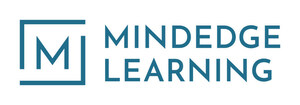New Data: MindEdge Learning and UPCEA study finds 70 percent of academic units offer alternative credentials
Colleges and universities report these credentials are engaging new groups of learners
BOSTON, April 29, 2020 /PRNewswire/ -- American colleges and universities are rapidly embracing alternative credentials as a supplement to traditional degree programs, according to a new survey by UPCEA (the University Professional and Continuing Education Association) in partnership with MindEdge Learning of Waltham, MA.
The survey found that a large majority (70 percent) of academic units already offer one or more types of alternative credential – such as a professional or graduate certificate, or any other academic credential that is not a traditional degree -- and another 26 percent are considering doing so in the future.
Because these credentials provide more flexibility and control to the learner, to the institution, and to many industries and professions, they are gaining in popularity and engaging learners at all stages of their lives and careers, the study concluded.
The survey probed the attitudes and experiences of 177 of UPCEA's member institutions. Taken together, these findings will help the education community gain a better understanding of offerings and attitudes toward alternative credentials, the process of alternative credential development, and the function of alternative credentials in a modern education portfolio.
Education Beyond a Traditional Degree
Alternative credentials are emerging as a significant enhancement to academia's long-standing portfolio. Key findings from the study include:
- Almost all respondents (93 percent) agree that alternative credentials engage populations differently from traditional degree programs, making them more widely accessible.
- The most commonly offered alternative credentials are professional certificates (75 percent), followed by graduate (66 percent) and undergraduate certificates (50 percent).
- Almost half (48 percent) of institutions that offer alternative credentials report that they are not represented on students' university records.
- The process of creating alternative credentials most commonly begins with staff ideas (29 percent) or a market need analysis (20 percent).
"It is critical for leaders in professional, continuing, and online education to support students in leveraging a more dynamic education journey with alternative credentials," said Jefferson Flanders, CEO of MindEdge Learning. "Accelerating the growth of a broader education, alternative credentials provide a new, flexible approach to learning that many people cannot access in the traditional classroom."
Supporting a New Path to Education
While credit-based undergraduate and graduate degrees will always hold considerable value, more stackable, decentralized credentials are essential to supporting today's increasingly digital economy. Yet there is not a consensus on the value of alternative credentials: 34 percent of survey respondents say that these new credentials are undervalued, and 30 percent say that they lack support from the university.
"The traditional model for higher education is showing signs of stress, if not obsolescence, a commonplace observation that is underscored by the pandemic," said Bob Hansen, CEO of UPCEA. "Alternative credentials have lower risk and shorter timelines, and can stack toward a larger credential such as a degree. In short, credential innovation is a revenue stream not to be ignored moving forward."
Alternative credential programs are built to upskill networks of students to remain sharp and engaged, but the opportunity to expand skills through alternative credentials must be more seriously valued as the economy and workforce continually change.
To view the full survey report, please visit here.
About the Methodology
An invitation to participate in the Alternative Credential survey was emailed to approximately 400 member institutions and also distributed through UPCEA's online member community, CORe. From October 9th, 2019 through January 9th, 2020, a total of 177 individuals responded to the survey. The margin of error is plus or minus 4.9% at the 95% confidence level. Of those responding, 56% were public institutions, 37% private, 2% community colleges and 1% were for profits. Five percent identified as "other."
About MindEdge
MindEdge, a learning company based in Waltham, MA, provides leadership, management, communication and educational solutions for organizations to help them meet their objectives. Founded in 1998 by Harvard and MIT educators, MindEdge specializes in higher education and professional development content and technology solutions and continues to innovate in the rapidly changing landscape of online education. The company's courseware features narrative, interactive learning, case studies, and simulations, as well as adaptive learning technology to maximize learner mastery of the content. Find out more at mindedge.com
About UPCEA
UPCEA is the association for professional, continuing, and online education. Founded in 1915, UPCEA now serves most of the leading public and private colleges and universities in North America. With innovative conferences and specialty seminars, research and benchmarking information, professional networking opportunities and timely publications, we support our members' service of contemporary learners and commitment to quality online education and student success. Based in Washington, D.C., UPCEA builds greater awareness of the vital link between adult learners and public policy issues. Visit www.upcea.edu.
Media Contact:
Shayna Chapel
InkHouse (for MindEdge)
[email protected]
SOURCE MindEdge

Related Links
WANT YOUR COMPANY'S NEWS FEATURED ON PRNEWSWIRE.COM?
Newsrooms &
Influencers
Digital Media
Outlets
Journalists
Opted In



Share this article